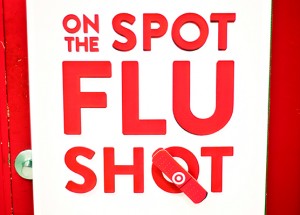It’s a familiar story, and a conversation that many Northern students have been having as the flu virus continues to spread through Michigan and the United States: a friend or family member got a flu vaccination, but days later still came down with severe flu-like symptoms.

In recent weeks, amidst rising concern over the validity of flu vaccinations as well as over the near epidemic spread of the influenza virus nationwide, many students have been left to make their decisions based on conversations like the one above and their own research.
Still, a handful of students are vying to battle a potential flu bug by their own means instead of by vaccination.
“I prefer to eat healthy food, exercise and get enough sleep to support my immune system,” said NMU student Zachary Schneider.
Aside from supporting his health in natural ways, Schneider also said because the vaccine only covers three strains of influenza, it is an unreasonable option for fighting the virus.
“Getting a vaccination for a single strain of a virus is illogical,” he said. “There are hundreds of strains (of influenza) that can evolve rapidly.”
As of yet, however, science has only allowed for three strains to be accounted for in the widely-distributed influenza vaccine. The vaccine protects recipients against the three most probable or common strains of the virus, based on world-wide patterns on a yearly basis, according to NMU Health Center physician Dave Luoma.
According to Luoma, world-wide epidemic flu patterns are examined immediately following the flu season to predict what strains will need to be included in the vaccination for the following year.
This may help to explain why many students still end up experiencing flu-like symptoms after having received the vaccine—they may have been unprotected against the strain that ultimately made them ill said Luoma.
“It is safe to say that these students that are getting these flu like symptoms after getting the flu shot are getting strains that weren’t covered by the flu shot,” he said. “Either they didn’t get a timely immune response or it’s a different strain that’s out there.”
Luoma cites that it can take up to 14 days for our immune systems to respond to the vaccine, and in that time individuals can still come down with the strains of influenza that are protected by the vaccine. He said it really boils down to “bad luck.”
“Most of what’s around, or about 95 percent of vaccines, are a killed vaccine,” he said, referring to the shot that most people receive when vaccinated. The other five percent would be the nasal spray vaccination, which is a live vaccine.
“There is no live ingredient (in the shot) that can actually infect people and that’s one of the fallacies–there is nothing in the vaccine that can do anything bad to you,” he added.
Yet many students are buying into the assumed safety of receiving the flu vaccination, as Luoma and other Health Center physicians have administered over 1200 flu shots since early December. Additionally, in just the last 12 days, the Health Center has run out of the vaccine three different times.
“This past week, we were giving probably 40 shots a day,” he said. “We may be running out this week, we’re not sure. There was such a big uptake–we’ve already gone through 1200 vaccines–and we keep trying to order more, but our suppliers told us that they don’t know if they’ll be able to get us any more. Our suppliers are running out.”
And while some students are streaming to the Health Center to get some of the last vaccines in stock, others continue to stick it out on their own terms. Most opponents of the flu vaccination cite things like inefficiency, safety and moral beliefs as reasons why they choose to avoid the shot, but Luoma, having heard most opposing views, still feels it’s a good idea.
“I think the biggest thing is the misconception that ‘I just heard that so-and-so got a vaccine and got sick from it,’” he said. The other thing is fear of needles, and we often hear ‘I never get sick, I don’t need a shot because I’ve never had the flu and I never get sick.” None of us are immune. And actually, in a university-type setting, the risk is really really high.”
Luoma said that the common thought is that, as college-aged students, we are young and healthy and don’t need the intervention of a vaccine to protect ourselves. Still, he strongly recommended the shot, as the peak of the yearly influenza outbreak is expected in the next two weeks.
“We usually get a boom in the second and third week of school,” he said. “Everyone is mixing, they’re bringing those infections from all over the country, then they mix up and this is just a really, really huge breeding ground.”
For more information on the flu virus or vaccine, visit the Center for Disease Control’s website at www.cdc.gov.



























